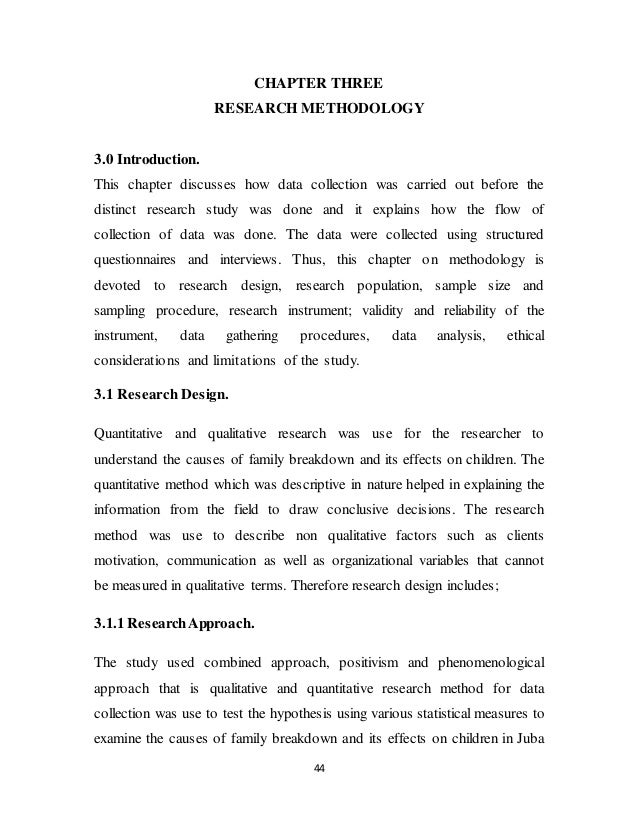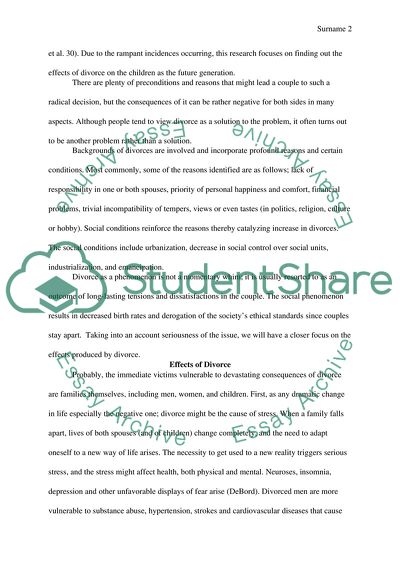
Effects of divorce on children
· The divorce changes the ability of these children to maintain interpersonal relationships; it implicates their social skills and also changes their psychological behaviors and attitudes. There are also increased behavioral problems that can be attributed to the non-existence of a healthy family unit · Divorce not only affects the child(ren) emotionally but it takes a toll on the parent- child relationship. In the wake of a divorce, most custodial parents expresses differing degrees of anger, disorder, decreased expectations from their child(ren), and a decline in the aptitude to separate the child(ren)’s needs and actions from those of the adults involved Divorce causes destruction on the psychological stability of numerous kids. (P. Slope, ) Furthermore, the psychological impacts of divorce are continuous: Kids from separated parents have more behavioral and emotional issues, negative feelings, and less psychological prosperity than grown-ups from intact families

Introduction
Divorce causes destruction on the psychological stability of numerous kids. (P. Slope, ) Furthermore, the psychological impacts of divorce are continuous: Kids from separated parents have more behavioral and emotional issues, negative feelings, and less psychological prosperity than grown-ups from intact families · The divorce changes the ability of these children to maintain interpersonal relationships; it implicates their social skills and also changes their psychological behaviors and attitudes. There are also increased behavioral problems that can be attributed to the non-existence of a healthy family unit · Divorce not only affects the child(ren) emotionally but it takes a toll on the parent- child relationship. In the wake of a divorce, most custodial parents expresses differing degrees of anger, disorder, decreased expectations from their child(ren), and a decline in the aptitude to separate the child(ren)’s needs and actions from those of the adults involved

Works Cited
· The divorce changes the ability of these children to maintain interpersonal relationships; it implicates their social skills and also changes their psychological behaviors and attitudes. There are also increased behavioral problems that can be attributed to the non-existence of a healthy family unit · Divorce not only affects the child(ren) emotionally but it takes a toll on the parent- child relationship. In the wake of a divorce, most custodial parents expresses differing degrees of anger, disorder, decreased expectations from their child(ren), and a decline in the aptitude to separate the child(ren)’s needs and actions from those of the adults involved Divorce causes destruction on the psychological stability of numerous kids. (P. Slope, ) Furthermore, the psychological impacts of divorce are continuous: Kids from separated parents have more behavioral and emotional issues, negative feelings, and less psychological prosperity than grown-ups from intact families

Literature Review:
· The divorce changes the ability of these children to maintain interpersonal relationships; it implicates their social skills and also changes their psychological behaviors and attitudes. There are also increased behavioral problems that can be attributed to the non-existence of a healthy family unit · Divorce not only affects the child(ren) emotionally but it takes a toll on the parent- child relationship. In the wake of a divorce, most custodial parents expresses differing degrees of anger, disorder, decreased expectations from their child(ren), and a decline in the aptitude to separate the child(ren)’s needs and actions from those of the adults involved Divorce causes destruction on the psychological stability of numerous kids. (P. Slope, ) Furthermore, the psychological impacts of divorce are continuous: Kids from separated parents have more behavioral and emotional issues, negative feelings, and less psychological prosperity than grown-ups from intact families

Cite this page
Divorce causes destruction on the psychological stability of numerous kids. (P. Slope, ) Furthermore, the psychological impacts of divorce are continuous: Kids from separated parents have more behavioral and emotional issues, negative feelings, and less psychological prosperity than grown-ups from intact families · The divorce changes the ability of these children to maintain interpersonal relationships; it implicates their social skills and also changes their psychological behaviors and attitudes. There are also increased behavioral problems that can be attributed to the non-existence of a healthy family unit · Divorce not only affects the child(ren) emotionally but it takes a toll on the parent- child relationship. In the wake of a divorce, most custodial parents expresses differing degrees of anger, disorder, decreased expectations from their child(ren), and a decline in the aptitude to separate the child(ren)’s needs and actions from those of the adults involved
No comments:
Post a Comment